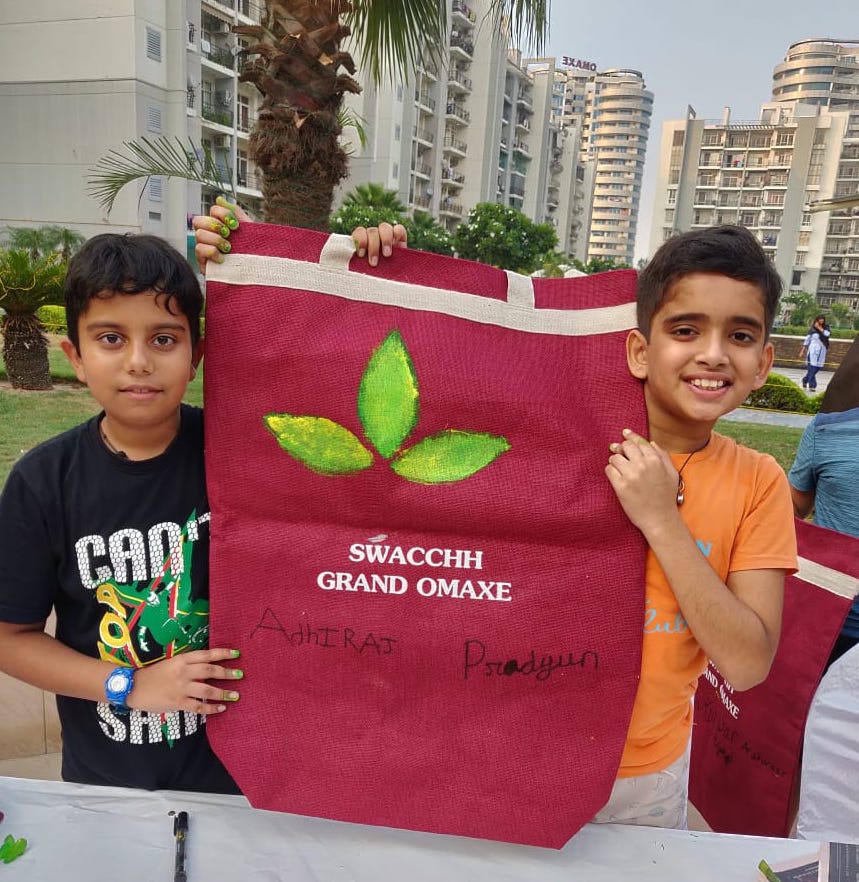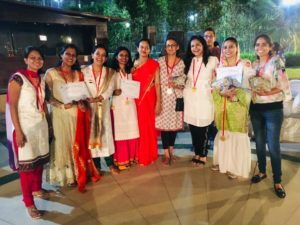
In July 2019, Noida Authority announced new rules for waste segregation at source (WSS). Our Resident Welfare Association (RWA) at Grand Omaxe, Sector 93 took the Noida Authority’s WSS project seriously and strictly enforced segregation at the household level. Within six months, all 1320 apartments, housing nearly 5000 residents, began segregating their waste daily, and continue to so despite the pandemic. Here’s how we did it!
The Swacchh Grand Omaxe project started in early September 2019. Initially, we were barely a handful of people who wanted to start a segregation drive. We did a lot of brainstorming on how to get started and hit upon a brilliant idea!
STEP 1: GET THE KIDS INVOLVED!

If you involve kids, their parents also participate and you can achieve a wider impact. We sent a WhatsApp message to all the residents informing them about an hour-long workshop on September 8 on the hows and whys of waste segregation. We also announced that a Certificate of Participation would be awarded to those children who involved themselves in the month-long activities we had planned. Within four hours, more than 100 children signed up! Their parents were fairly competitive among themselves, frankly!
At the session on segregation for our Child Ambassadors, we conducted experiments to give them a hands-on experience of waste segregation and recycling. We also played games on which type of waste goes in each bin, etc. They all took a pledge to segregate waste in their homes and outside. Once the kids were ready, they visited each floor of every tower along with parent volunteers to perform a skit to educate residents. You could see the energy and enthusiasm in the kids; they just wanted to continue performing! On October 2, which is also celebrated as Swacch Bharat Diwas, the Child Ambassadors were felicitated and further encouraged through art and other activities.
STEP 2: IEC (INFORM. EDUCATE. COMMUNICATE.)
The success of any new initiative rests on how successfully you change people’s behaviors. So, while we were getting our infrastructure in place, we simultaneously began an extensive IEC program – not only for the residents but all other stakeholders including Society’s Board members, support staff, and maids.

They were educated about the different types of waste and segregation procedures. Residents were informed that our housekeeping staff would collect the wet and dry waste from their doorstep every morning only if followed the prescribed rules (for instance, covered bins with no plastic bin-liners).
We trained all the housekeeping staff, supervisors, and security guards through fun activities. Maids, cooks, and drivers were given leaflets explaining the different types of waste in Bengali and Hindi and explained how to segregate. Since plastic liners in wet-waste bins were banned, it was important to let the maids know that henceforth, they had one more job to do – that is, wash the bins daily.
STEP 3: TIE-UP WITH VENDOR FOR WASTE DISPOSAL

Noida Authority had appointed AG Enviro as the agency for waste collection from all bulk generators. We got in touch with them and agreed that, as prescribed by the Authority, it would charge a nominal rate each month for the pickup and disposal of waste as per prescribed norms. AG Enviro provided us with 1100 liter green & blue bins to aggregate the waste collected daily.
STEP 4: BUILD INFRASTRUCTURE TO MANAGE SEGREGATED WASTE

We placed eight trio bins (Green, Blue & Red) and 20 twin bins (blue and green) for aggregation of waste in common areas like the play area, clubhouse, basement, and gym. We purchased 44 240-liter bins for waste pick-up from flats and another 44 60-liter bins for the common area in front of each tower. Each of the 22 towers was given separate bins to collect segregated waste: green for wet waste, blue bin for dry waste, and a red jute bag for sanitary waste and hazardous waste. Later, a trolley was also provided to the housekeeping staff to transport the bins in the elevators since they were finding it difficult to drag the large bins down every floor. That proved to be very motivating for the staff.
LAST WORDS: BE FIRM AND PATIENT

We gave sufficient time to the residents to prepare and sent notices to residents who didn’t segregate. Since we wanted 100% results, we did not collect waste from any home which did not segregate. Many residents were left with no choice since it would keep rotting outside their doorstep. A month later, we started seeing results.
A lot of residents question us about where the waste is going and why they should segregate if it gets mixed up at a landfill eventually. We always tell them that this is the right thing to do and the municipal authorities will take care of the rest. We also keep motivating and talking to people constantly. The reality is, waste segregation at source must become a part of our lifestyle.
Ms. Ranu Kalra is an Executive Member, Association of Apartment Owners, Grand Omaxe, Sector 93, Noida. You can email her at ranu.bhalla1983@gmail.com



